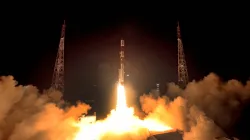Andhra Pradesh startup successfully tests ultra-high-frequency communication tech on ISRO's POEM-4
ISRO's POEM-4 is a module that is part of the ISRO SpaDex Mission. It features 24 payloads designed to conduct various experiments in space, including one experiment aimed at sprouting cowpea seeds in a space environment.

Andhra Pradesh-based space start-up N Space Tech announced on Friday that it has successfully tested an indigenously developed ultra-high-frequency communication system aboard its payload, SwetchaSat, using ISRO's POEM-4 platform. The company received its inaugural batch of data packets from SwetchaSat-V0 at the ISRO Telemetry, Tracking and Command Network (ISTRAC) in Bengaluru at 9:20 PM on January 1.
"This remarkable achievement showcases our capability in ultra-high-frequency (UHF) communication with precision and reliability, cementing our position as a leader in space technology. It also represents a significant step in our endeavour to advance satellite-communication technology" said Divya Kothamasu, co-founder of N Space Tech, in a statement to PTI.
Building on this success, the start-up is now setting its sights on future missions aimed at showcasing capabilities in the Ku-band, she added.
The communication, power, computing, and sensor modules of the SwetchaSat payload were all designed and developed in-house at N Space Tech.
"SwetchaSAT, an ultra-high-frequency communication technology demonstrated by N Space Tech on the POEM-4 platform of PSLV C60, paves the way for faster and more reliable communication for many satellite applications," Sudheer Kumar N, a former director at the Indian Space Research Organisation (ISRO).
"The success of SwetchaSAT-V0 marks a critical step forward in our mission to develop and deploy advanced communication technologies," Kothamasu noted.
Founded in 2020, N Space Tech focuses on satellite communication systems and innovative space solutions.
The ISRO's PSLV Orbital Experimental Module (POEM-4) repurposes the spent fourth stage of the PSLV rocket to create a stable orbital environment for experimental payloads. The POEM-4 platform accommodates 24 payloads from a mix of ISRO laboratories, private start-ups, and educational institutions.
Meanwhile, ISRO is set to achieve a significant milestone with a Geosynchronous Launch Vehicle mission scheduled for January, which will represent the 100th launch from the Sriharikota spaceport, as stated by a key official. The previous mission, PSLV-C60, occurred on Monday and successfully deployed two spacecraft to conduct the Space Docking Experiment in a circular orbit, according to ISRO Chairman S. Somanath.
ALSO READ: Space Docking Mission: Successful orbit injection achieved for upcoming ISRO docking experiment
Inputs from PTI